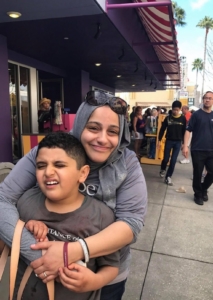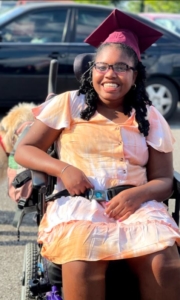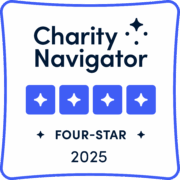Our Fight Against Lafora Disease
Families are raising awareness to save their children from a fatal genetic condition, Lafora disease.

Mother, Azeza with Gehad
Moniqueca Barfield from Gardendale, Alabama and Azeza Kasham from Ann Arbor, Michigan are pleaing for support in their fight against Lafora disease. Azeza, mother of three, has already lost her first-born son Haitham to this devastating disease at just 16 years old in 2019 and is now fighting for her second son Gehad, also diagnosed with Lafora disease who is only 12.
“Loosing one son to this disease is enough and now the heartache is harder to bear, going through it all again with Gehad.” – cried Azeza Kasham.
A cure didn’t come in time for Haitham, but there is hope for Gehad. Lafora disease is a single gene disorder. By replacing one gene you can cure the disease. Scientists have shown they can cure the deadly disease in the laboratory. Families like Azeza and Moniqueca are desperate to bring these treatments out of the labs and into the children who need them.
Moniqueca is the mother of 18-year-old Khari McCrary. Khari developed symptoms when she was just 12, and that’s when she experienced her first seizure. Just like all kids with Lafora disease, symptoms start in their early teens and are usually misdiagnosed with milder epilepsy.

Khari at 18
It hurts not knowing whether my child will live long enough for a cure, and it hurts seeing her friends in college, starting their young adulthood, and knowing my child will never have that experience. – Moniqueca Barfield
Lafora disease is a terminal neurological degenerative disease, a genetic condition caused by a glycogen storage issue where the body cannot process glycogen, accumulating and resulting in a toxic buildup of Lafora bodies in the heart, spine and the brain.
Once symptoms start, the average lifespan is roughly 2-10 years with most children passing away in the late teens or early twenties.
There are no signs or symptoms initially until the children have symptoms of seizures. Symptoms start in children in their early teens (sometimes earlier) and are usually misdiagnosed with epilepsy. Children are normally quite intelligent and active throughout their schooling years. Symptoms of seizures and cognitive decline progress quite fast, and within the first few years of onset. The doctors realize that something more sinister is wrong when epilepsy medications continue not to control the epilepsy as they should. Seizures become more frequent and uncontrolled over time which results in death. Further testing is done, before getting the devastating diagnosis of Lafora disease.
These children also suffer from difficulty walking and eating, speech difficulty, swallowing, muscle spasms, behavioral changes, cognitive decline, confusion, childhood dementia, photosensitivity, myoclonus and increasingly intractable seizures. These children are constantly in and out of hospital to treat uncontrolled seizures that cannot be contained in the home. The childhood dementia onset also comes on quite quickly, with children becoming disorientated, angry, forgetful, and confused. Watching your parents go through the symptoms of dementia at their old age is heartbreaking, imagine seeing it in your child? “Watching them slowly fade away is gut wrenching.”
Prior to this diagnosis, children like Haitham, Gehad and Khari were like most other teens in the USA, attending school full time with no signs or symptoms of any abnormalities. They were healthy and normal, had social relationships with family, friends, and peers.
Chelsea’s Hope Lafora Children Research Fund have been searching for a cure and creating awareness since 2007. Our mission is to fundraise for research, support the Lafora community, engage key stakeholders and promote the interests of patients. Thanks to the Fund, there have been promising breakthroughs in research, but Covid and lack of funds have caused delays that are taking away precious time. With enough funding we could have clinical trials for children beginning in 2022. So the fight to get the necessary funding to push these forward is what we need now. Time is of the essence for these children and every moment counts.

Gehad at 12
If you would like to help Moniqueca and Azeza save their children before it’s too late, please go to https://chelseashope.org/donate/ to see ways you can help or email info@chelseashope.org.


Leave a Reply
Want to join the discussion?Feel free to contribute!